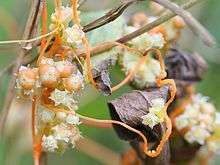Cuscuta campestris
| Cuscuta campestris | |
|---|---|
 | |
| Scientific classification | |
| Kingdom: | Plantae |
| (unranked): | Angiosperms |
| (unranked): | Eudicots |
| (unranked): | Asterids |
| Order: | Solanales |
| Family: | Convolvulaceae |
| Genus: | Cuscuta |
| Species: | C. campestris |
| Binomial name | |
| Cuscuta campestris Yunck. | |
Cuscuta campestris, with the common names field dodder, golden dodder, large-seeded alfalfa dodder, yellow dodder and prairie dodder, is a parasitic plant which belongs to the family Convolvulaceae. It was formerly classified in the family Cuscutaceae.
It is native to central North America. It is a parasite of a wide range of herbaceous plants.
It is a pest of lucerne and other legumes. It has become a widespread weed in many countries. It is known as 'golden dodder' in Australia.
It has been confused in some recent literature with Cuscuta pentagona Engelmann, but the differences between the two species are clear.[1]
Remarkably, the seeds of the plant have been found to become dispersed by waterfowl in significant numbers.[2]
References
- ↑ Costea, M., Nesom, G.L. & Stefanovic, S. (2006) Taxonomy of the Cuscuta pentagona complex (Convolvulaceae) in North America. Sida 22(1): 151-175.
- ↑ M. Costea, S. Stefanović, M. A. García, S. De La Cruz, M. L. Casazza, and A. J. Green (2016), "Waterfowl endozoochory: An overlooked long-distance dispersal mode for Cuscuta (dodder)", American journal of botany, 103: 837–844, doi:10.3732/ajb.1500507
External links
- Calflora Database: Cuscuta campestris (Field dodder)
- USDA Plants Profile for Cuscuta pentagona (fiveangled dodder), former synonym of Cuscuta campestris.
- GBIF−Species in GRIN Taxonomy: Cuscuta campestris
This article is issued from Wikipedia - version of the 7/7/2016. The text is available under the Creative Commons Attribution/Share Alike but additional terms may apply for the media files.